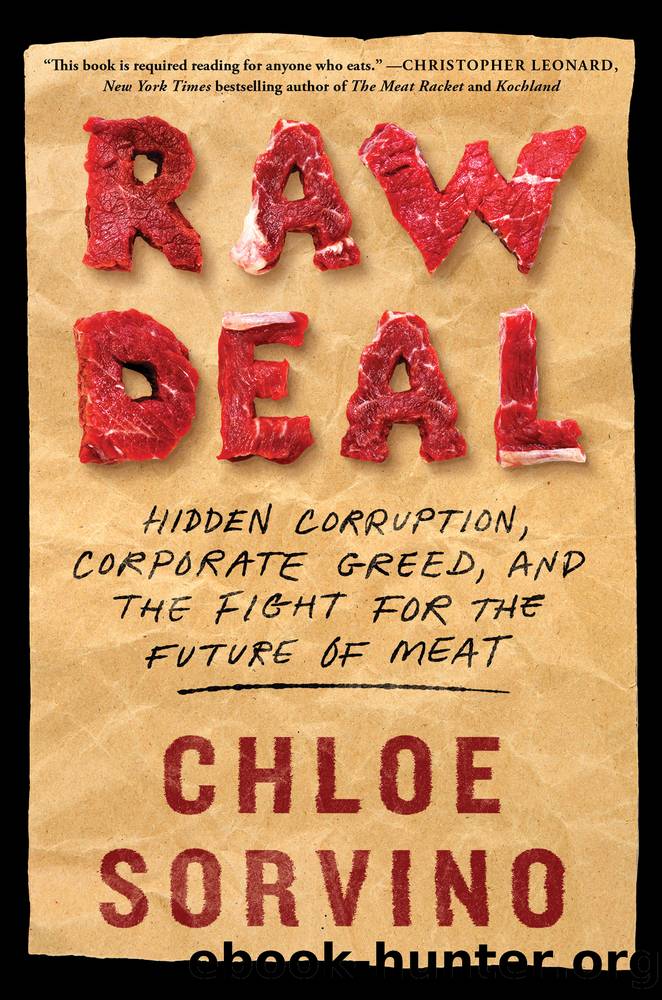Raw Deal by Chloe Sorvino

Author:Chloe Sorvino
Language: eng
Format: epub
Publisher: Atria Books
Published: 2022-12-06T00:00:00+00:00
A Billionaireâs Feast
Iâve done my own Supersize Meâinspired reporting over the years, but when it came to the thought of lining up lab-grown alternatives like Good Meatâs chicken nuggets, Upsideâs chicken breast, and Aleph Farmsâ rib eye, I was both fascinated with trying to see and smell it in person and completely perturbed by actually eating it. I ended up opting out. There are many complicated moral dilemmas involved when it comes to eating meat. That all got heightened and turned on its head, for me, when contemplating lab-grown meat. Aside from the antibiotics use and fetal bovine serum, lab-grown meat is designed and produced in a sterile environment. Thereâs no chance for Fred Provenzaâs beloved phytonutrients to exist.
There are also broader ethical implications, says Sikowis Nobiss, of the Plains Cree and Saulteaux nations, who is the executive director of Great Plains Action Society, an Indigenous-led organization focused on climate and agribusiness. âI donât think I could eat it,â Nobiss said. âWe think rocks are alive. Why wouldnât we think that this thing running in a lab is not alive, and itâs basically being grown just for consumption. It never moves. It just sits there and it just grows? I donât think thatâs okay, and I donât think thatâs the way to solve the worldâs problems.â
But many of the worldâs richest men sure do. That includes Bill Gates, who as of May 2022 had the fourth-highest net worth in the world, to a tune of nearly $130 billion. A small fraction of that has been invested in food tech. Gatesâ shillings can instantly change a market. Gatesâan investor in Eat Just and Upside Foods, as well as Impossible Foods, Beyond, Natureâs Fyndâthinks rich nations should eat 100 percent synthetic meat. He doesnât think the eighty poorest countries will be eating synthetic meatâa statement that ignores the traditions of pastoralists and Indigenous groups.
Most of Gatesâ deals are early stage, except some follow-ons in Impossible rounds in 2018 when Impossible raised $189 million, and again in 2019, when Gates personally joined a $300 million roster that included Jay-Z, Katy Perry, Serena Williams, and her husband, Reddit cofounder Alexis Ohanian. Gatesâ stake in Impossible is still minority but will probably amount to a tasty exit. Impossible has been eyeing a public market debut, which could value the start-up at $10 billion or more.
Gates and many other Impossible investors donât need the money. But thatâs not the point. Gates has backed most of these top start-ups and his investments show that he is intent on bringing alternative proteinsâfrom Impossibleâs heme-and-soy to lab-grown meatâto the masses. His track record shows he tends to accomplish what he sets out to. But Gates is playing both sides. Gates is also the top farmland owner in the country, according to the Land Report. Yet for all the talk of a sustainable revolution, that cropland is mostly farmed as industrially and conventionally as it comes.II Across the more than 250,000 acres traced to Gatesâ fortune through different shell companies,
Download
This site does not store any files on its server. We only index and link to content provided by other sites. Please contact the content providers to delete copyright contents if any and email us, we'll remove relevant links or contents immediately.
Life 3.0: Being Human in the Age of Artificial Intelligence by Tegmark Max(5558)
The Sports Rules Book by Human Kinetics(4386)
The Age of Surveillance Capitalism by Shoshana Zuboff(4292)
ACT Math For Dummies by Zegarelli Mark(4048)
Unlabel: Selling You Without Selling Out by Marc Ecko(3662)
Blood, Sweat, and Pixels by Jason Schreier(3624)
Hidden Persuasion: 33 psychological influence techniques in advertising by Marc Andrews & Matthijs van Leeuwen & Rick van Baaren(3565)
The Pixar Touch by David A. Price(3438)
Bad Pharma by Ben Goldacre(3427)
Urban Outlaw by Magnus Walker(3395)
Project Animal Farm: An Accidental Journey into the Secret World of Farming and the Truth About Our Food by Sonia Faruqi(3221)
Kitchen confidential by Anthony Bourdain(3089)
Brotopia by Emily Chang(3054)
Slugfest by Reed Tucker(3002)
The Content Trap by Bharat Anand(2924)
The Airbnb Story by Leigh Gallagher(2854)
Coffee for One by KJ Fallon(2636)
Smuggler's Cove: Exotic Cocktails, Rum, and the Cult of Tiki by Martin Cate & Rebecca Cate(2540)
Beer is proof God loves us by Charles W. Bamforth(2461)
